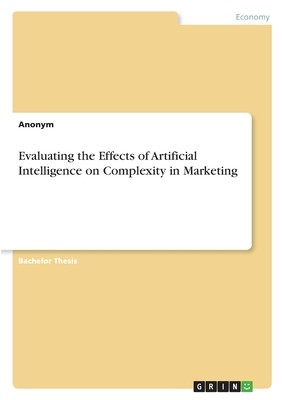
- We will send in 10–14 business days.
- Author: Anonym
- Publisher: GRIN Verlag
- Year: 2021
- Pages: 208
- ISBN-10: 3346377873
- ISBN-13: 9783346377876
- Format: 14.8 x 21 x 1.2 cm, softcover
- Language: English
- SAVE -10% with code: EXTRA
Evaluating the Effects of Artificial Intelligence on Complexity in Marketing (e-book) (used book) | bookbook.eu
Reviews
Description
Bachelor Thesis from the year 2018 in the subject Business economics - Offline Marketing and Online Marketing, grade: 1,9, Reutlingen University (ESB Business School), language: English, abstract: The research question explored in this paper is about a potential benefit of AI in marketing, which to this day is comparatively unexplored. Even though the concept of AI has been around since the 1950s, and current research and development make significant progress in this area, scientific literature dealing with AI in marketing consists of less than 300 published articles. This paper distinguishes itself from related papers, as it goes beyond investigating whether AI has an impact on business or not. The results of this thesis shall not only show the potential AI holds for marketing, but also suggest constant theoretical exploration of untapped fields in marketing. The Internet of things (IoT) and big data changed customer behavior and how businesses work. This trend has led to a continued increase in complexity for marketing managers. In 2017, 8.4 billion devices were connected to the internet. This number is forecasted to increase to 20.4 billion by 2020. The immense amount of data generated, collected, and analyzed has propelled new markets, such as big data and artificial intelligence. Marketing managers struggle to keep up with the sheer volume of data available and the surging complexity of marketing. Connecting dispersed data and finding patterns, leads to helpful insights, which are said to reduce complexity. Many businesses lack a clear strategy to tap into the benefits of AI and gain a competitive advantage.
EXTRA 10 % discount with code: EXTRA
The promotion ends in 20d.23:49:09
The discount code is valid when purchasing from 10 €. Discounts do not stack.
- Author: Anonym
- Publisher: GRIN Verlag
- Year: 2021
- Pages: 208
- ISBN-10: 3346377873
- ISBN-13: 9783346377876
- Format: 14.8 x 21 x 1.2 cm, softcover
- Language: English English
Bachelor Thesis from the year 2018 in the subject Business economics - Offline Marketing and Online Marketing, grade: 1,9, Reutlingen University (ESB Business School), language: English, abstract: The research question explored in this paper is about a potential benefit of AI in marketing, which to this day is comparatively unexplored. Even though the concept of AI has been around since the 1950s, and current research and development make significant progress in this area, scientific literature dealing with AI in marketing consists of less than 300 published articles. This paper distinguishes itself from related papers, as it goes beyond investigating whether AI has an impact on business or not. The results of this thesis shall not only show the potential AI holds for marketing, but also suggest constant theoretical exploration of untapped fields in marketing. The Internet of things (IoT) and big data changed customer behavior and how businesses work. This trend has led to a continued increase in complexity for marketing managers. In 2017, 8.4 billion devices were connected to the internet. This number is forecasted to increase to 20.4 billion by 2020. The immense amount of data generated, collected, and analyzed has propelled new markets, such as big data and artificial intelligence. Marketing managers struggle to keep up with the sheer volume of data available and the surging complexity of marketing. Connecting dispersed data and finding patterns, leads to helpful insights, which are said to reduce complexity. Many businesses lack a clear strategy to tap into the benefits of AI and gain a competitive advantage.


Reviews